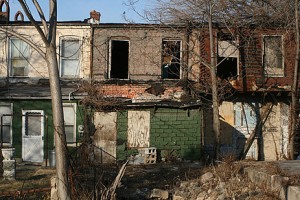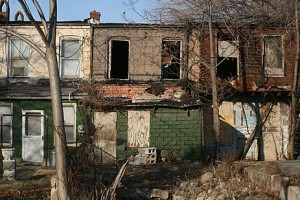 The Environmental Protection Agency is about to spend millions looking at how pollution and a crap environment leads to poverty and the general decline of quality of life in the U.S., The New York Times’ Green blog reports. It’s all part of the agency’s commitment to better address environmental injustice. You’ve probably noticed that factories, power plants, and superfund sites tend to cluster in communities already burdened with social stresses; it’s a vicious cycle where being poor means your environment is terrible, and poverty plus the terrible environment makes you more sick, which in turn can keep you poor. Thanks, capitalism!
The Environmental Protection Agency is about to spend millions looking at how pollution and a crap environment leads to poverty and the general decline of quality of life in the U.S., The New York Times’ Green blog reports. It’s all part of the agency’s commitment to better address environmental injustice. You’ve probably noticed that factories, power plants, and superfund sites tend to cluster in communities already burdened with social stresses; it’s a vicious cycle where being poor means your environment is terrible, and poverty plus the terrible environment makes you more sick, which in turn can keep you poor. Thanks, capitalism!
Life is seriously unfair: Though you wouldn’t know it to look at an environmental rally or, unfortunately, the staff of Grist, minority, low-income, and tribal populations are disproportionately harmed by environmental woes. Not only are they exposed to more pollution, they’re also more affected by it — research suggests that the health effects of pollutant exposure join forces with other poverty-related factors like poor nutrition and stress from unmet needs, exacerbating health effects.
If that’s not grim enough, try this: These environmental effects can also contribute to keeping poor folks poor. One study from Columbia University found that prenatal exposure to pollutants is linked to behavior problems and cognitive delays, meaning that kids from inner-city neighborhoods may have a harder time staying in school and getting into college. Which makes it more likely that their kids, too, will get more pollution exposure plus the bonus poverty-related stresses that make it worse.
The EPA gives a shit: The new EPA grants will encourage researchers to examine this double whammy and what can be done about it. EPA administrator Lisa P. Jackson has made environmental justice an explicit goal. In a speech last January, she explained how addressing the disproportionate effect of pollution is key to addressing other social issues, from health care to the economy:
We can talk about health care. But we also have to talk about how the poor — who get sick more often because they live in neighborhoods where the air and water are polluted — are the same people who go to the emergency room for treatment. That drives up health care costs for everyone. It hurts the local and the national economy.
But is that enough? Research alone won’t fix the problem, or even make all environmentalists acknowledge that there is one. And the Times reports that some environmental justice activists are frustrated with the slow-paced cycle of discussion, study, and more discussion. But the EPA believes a solid foundation of empirical results will help bolster the case for action. That is, if we lived in a world in which politicians listened to scientists.




